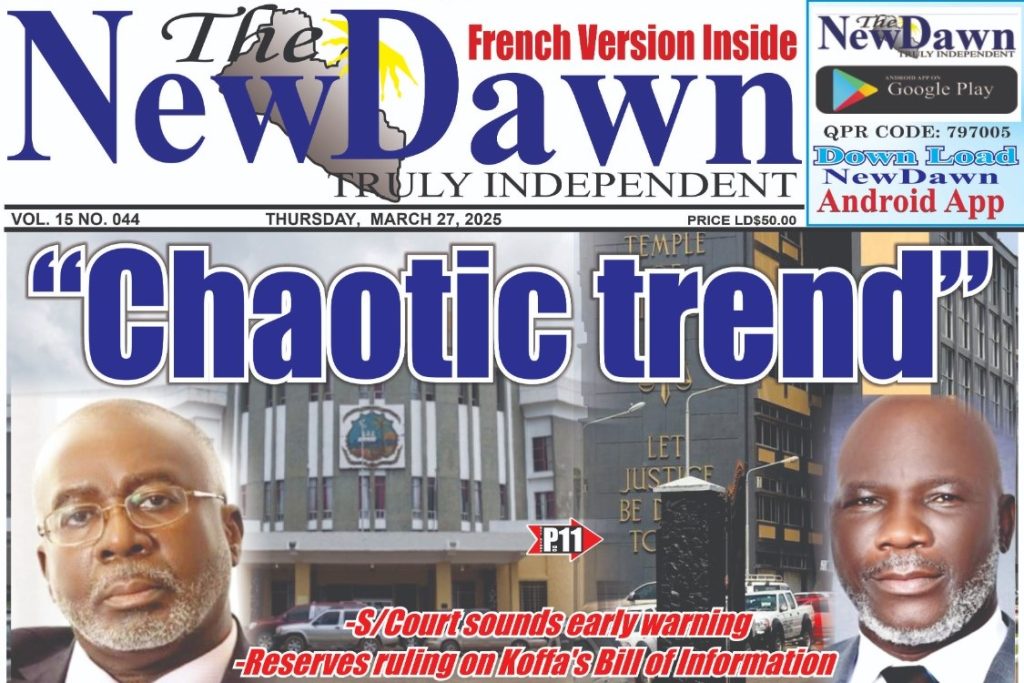The Supreme Court of Liberia has expressed grave concerns over the ongoing leadership crisis in the House of Representatives, characterizing the situation as a “chaotic trend” with potentially destabilizing consequences for the nation. The Court’s concerns stem from a legal challenge brought by embattled Speaker J. Fonati Koffa against his removal by a majority bloc, now led by “Regime Speaker” Richard N. Koon. The Court heard arguments from both sides, sharply questioning the majority bloc’s justification for their actions, particularly their decision to hold separate sessions presided over by Deputy Speaker Thomas Fallah while Speaker Koffa remained present and available. The Court emphasized established constitutional procedures for removing a Speaker, which include due process and a formal motion within a unified session, none of which appeared to have been followed in this instance.
The justices raised fundamental questions about the legality and implications of the majority bloc’s actions. They questioned the legitimacy of Deputy Speaker Fallah presiding over a session while the constitutional Speaker was present and whether due process was afforded to Speaker Koffa. The Court highlighted the potential for further chaos if such actions were to become a precedent, envisioning a scenario where opposing factions continuously challenge each other’s legitimacy and hold parallel sessions, thereby paralyzing the legislative process and undermining the rule of law. The Court underscored the importance of adherence to constitutional procedures to maintain stability and order within the government.
The Court’s questioning focused on the majority bloc’s disregard for established procedures and the potential repercussions for the country’s governance. The justices pointedly questioned whether the majority bloc had followed proper protocol in removing Speaker Koffa, noting that the constitutional process mandates a formal motion and due process. They expressed concern that the majority bloc’s actions could create a dangerous precedent, where factions within the House could bypass established rules and procedures, leading to instability and chaos. The Court stressed that any actions that breach the constitution are subject to judicial review, emphasizing its role as the ultimate arbiter of constitutional matters.
The legal arguments presented before the Court highlighted the conflicting interpretations of the law and procedure governing the removal of a Speaker. Counsel for the minority bloc, Cllr. Arthur Tamba Johnson, urged the Court to enforce its earlier ruling from December 6, 2024, which seemingly addressed the initial stages of this leadership dispute. He argued that the majority bloc’s actions were in direct contravention of that ruling and constituted interference with the Court’s mandate. He cited the Revised Law of the Court to support his argument that the Court has the authority to prevent interference with its judgments. He emphasized that the bill of information filed by Speaker Koffa sought to address the improper and obstructive actions impeding the Court’s December ruling.
Conversely, the respondent’s counsel, including former Senator Varney Sherman, argued for the dismissal of the bill of information, characterizing it as reckless and unfounded. They contended that Speaker Koffa had refused to participate in the session where the vote of no confidence was taken, and that consequently, the Deputy Speaker was authorized to preside and conduct business in accordance with the constitution and established procedures. They asserted that the majority bloc had followed the appropriate legal channels in electing new leadership. This stark contrast in legal interpretations underscores the complexity of the situation and the need for a clear and decisive ruling from the Supreme Court.
The ongoing leadership struggle within the House of Representatives has far-reaching implications for Liberia’s political stability and democratic processes. The Supreme Court’s intervention and its expressed concerns underscore the gravity of the situation. The Court’s eventual ruling will not only determine the legitimate leadership of the House but also set a precedent for future disputes and potentially clarify the interpretation of constitutional provisions regarding legislative procedures. The case is a crucial test of the strength of Liberia’s democratic institutions and the rule of law. The Court’s decision is eagerly awaited, as it has the potential to either restore order and stability or further exacerbate the existing political tensions.














